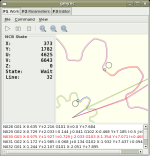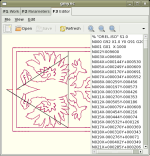Обзор
страница в процессе перевода
Graphical user interface: gmync
|
|
Work pane
This is the main control view. It includes graphical representation of a loaded
program, a set of NCB state values and current tool coordinates. At the bottom
the program listing is located, with current frame being highlighted.
Small circles on the graphical display represent current interpolator position
and are always located strictly on the cutting path. Larger circles represent
current tool coordinates. In case of a 4-axis program they are likely to be
slightly shifted from the cutting path according to part height and gaps settings.
|
|
|
Parameters pane
This view allows to change various parameters affecting system's behaviour.
The parameters are grouped by subsytems they are related to. Once you change
a parameter, the server notifies all other terminals connected to it
about the change.
Concrete set of parameters used in a particular MyNC installation is
determined by an XML configuration file. If some of the parameters are
unnecessary, they can be excluded from the view by editing that file.
This also allows to translate parameters names and descriptions to
other languages easily.
|
|
|
Editor pane
This is a standalone editor provided for convinience. Here you can check
the correctness of your program before loading it into the control block
and make some changes if necessary. This editor is also available as a separate
application called "gncedit".
|
Standalone control daemon: myncbd
MyNC is a distributed system. The central part is a "numerical control block", or NCB,
which runs as a usermode application with relaxed timing requirements: standard preemptible Linux kernel
would do pretty well, -rt versions could also be adopted. The NCB relies upon
a low-level subsystem called "mykernel", which operates in a hard real-time environment
provided by "-mync" kernel patchset. The task of "mykernel" is to tie up three execution
environments: user-mode, kernel-mode, and real-time. Real-time context is a subset of the kernel-mode
which runs asynchronously to the rest of the kernel and thus can not transparently access
usual kernel data structures. "myncbd" daemon itself holds user-mode NCB code and
provides communication interface for control terminals.
© 2008–2011 Дмитрий Шатров 


